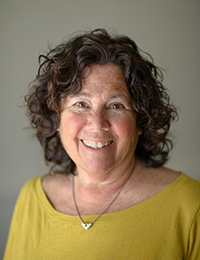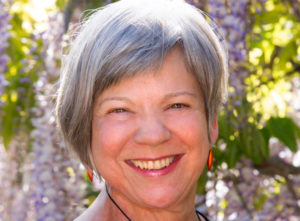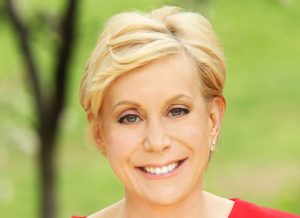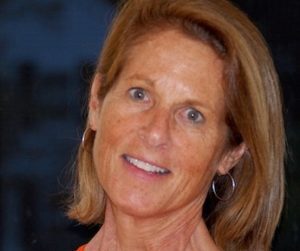[NCSD guest blog post by Lynda Shrager]

9:30 a.m. The pediatrician comes out and looks uneasy. He does not make eye contact as he starts explaining that test results indicate our daughter has Crohn’s Disease. Leslie is oblivious to the conversation, delighting in swirling brightly colored balls around swooping wires and hearing them knock –knock –knock.
1:15 p.m. The gynecologist looks uneasy. He does not make eye contact as he continues probing my breast. I was oblivious, immersed in sharing the sad tale that the baby he had delivered only six and a half years ago has a severe, incurable disease that I barely knew anything about. Suddenly, I tune back in to hear, “Lynda, this is not your day. You have a lump in your breast.” The room began to swirl.
July 12, 1994. A day that will live in infamy. At least in our house.
A few days later, still groggy with anesthesia from my lumpectomy and lymph node surgery, I opened my eyes as a little old lady walked into my hospital room. She looked to be around age 75, a good sign. “I’m from Reach to Recovery,” she said and then delivered the breast cancer pep talk and presented me with my breast cancer goody bag from the American Cancer Society.
Her parting words still stick with me: “You are now a survivor.”
How could I be a survivor already? I was 36 years old. I hadn’t survived anything yet. Survivor is a powerful word which conjured up thoughts of air crash survivors, holocaust survivors, and combat survivors. “I want to live as long as you,” I thought, and then I can call myself a survivor.
What do you do when you and your child are diagnosed with devastating diseases within hours of each other?
My first choice was to have a complete nervous breakdown. However, since my child was involved, I could not afford myself that luxury. Instead I needed to pull myself together and take control of this crisis – fast!
Everything happens so quickly in a medical crisis – let alone two. The journey began before I had time to take a breath – the journey into the world of hospitals, doctors, operating rooms, diagnostic procedures, treatments. I at once began gathering information on which to base potentially life-altering decisions. Two simultaneous nightmares.
Paperwork flying all over the place. Doctor’s appointments, requests for bloodwork, countless prescriptions, orders for diagnostic tests, directions to different offices, and documentation for the two second opinions. Slips of paper, notes in the margins of my planner, post-it notes on the kitchen counter, refrigerator, and car dashboard, all with reminders of what needed to be done. All this on top of the fact that I was working, caring for my younger daughter as well, active on a number of boards, and maintaining a household.
Déjà vu
Four years later, my mother received a devastating diagnosis of metastatic cancer of unknown origin. The whole nightmare resumed with no tool to guide us. Together, my mom and I created a planner with special sheets that would guide the user to document all the necessary information to get through each step. Two years later, my book Otherwise Healthy – A Planner to Focus Your Thoughts on Organizing Life after Being Diagnosed with Breast Cancer was published.
The theory behind Otherwise Healthyis that in a crisis we tend to look at the total picture, which is extremely overwhelming. Instead, we need to break down life into tiny little bites that we can handle. We have to empower ourselves to take back control.
How? By using tools such as Otherwise Healthy. By educating ourselves about our disease and its treatments. By becoming savvy health consumers. By understanding that we are the manager of our own healthcare team. By understanding it is up to all of us to become more informed, active participants in our own medical care by learning how to acquire, understand, and make use of pertinent medical information. By empowering ourselves with knowledge, we will make the best possible medical decisions.
Defining Survivor
After 23 years of mentoring hundreds of survivors and caregivers, I have figured out the meaning of survivor. We get to be the beneficiary of a heightened mind’s eye. This allows us to see things in a new light, as we have never seen them before. Unlike others, we know to look at the very simple things in life and appreciate them for their beauty and wonder.
We have been given a most special gift – the ability to distinguish what really is and is not important. We must always remember to live in the present and not get so caught up in striving for our goals for the future that we forget to experience the journey of getting there.
Lynda Shrager is a registered occupational therapist with a master’s degree in social work, focusing on geriatric rehabilitation. She is a certified aging in place specialist (CAPS) and a professional organizer. Lynda is a featured columnist (The Organized Caregiver) for Everyday Health, an international speaker, and author of Otherwise Healthy – A Planner to Focus Your Thoughts on Organizing Life after Being Diagnosed with Breast Cancer. Her newest book on Aging in Place will be published in the spring of 2018. You can learn more about Lynda at OtherwiseHealthy.com and find her on Twitter @lyndashrager and Facebook at facebook.com/theorganizedcaregiver.




